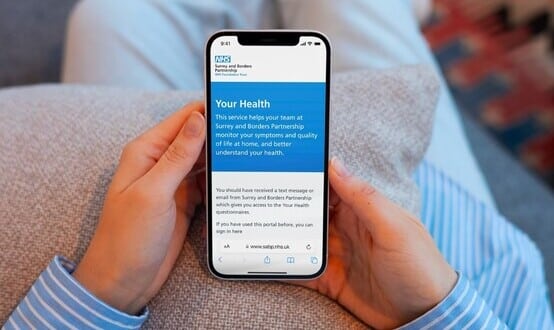Health CIO profile: Lisa Franklin
- 26 November 2014

Almost two years into her job as director of information and technology at Southern Health NHS Foundation Trust, Lisa Franklin admits that she wasn’t born with a burning desire to work in IT.
“But there were some choices I made early on in my career that would eventually steer me in that direction,” she says. “Having completed my studies and taken time out in Australia, I literally grabbed the first job available – which just happened to be in public sector housing.
“Although a somewhat arbitrary choice, I soon found it really interesting; it was quite complex because it had a political angle to it, and we were at least trying to do things that were good for people. From there, I moved into local government and education, before finally getting into healthcare which is where I really wanted to be.”
After gaining experience in several NHS posts, Franklin spent seven years as director of health informatics consulting at education support services company Tribal, before moving into a similar role at Capita after it acquired Tribal’s healthcare consultancy operation in 2011.
Passion for data
“What has particularly fascinated me about healthcare IT from day one is getting to the bottom of what’s really happening on the frontline – in terms of benchmarking and being able to understand different types of activity, so as to identify where some people need to improve and others perhaps don’t,” Franklin says.
“In my first health authority job, I got involved in a lot of very early work around primary care performance indicators. By looking at the data that supported different activities within various care settings, we could begin to benchmark different practices.
“I quickly realised what an amazing effect this could have. It may sound basic now, but in one instance we discovered that nurses weren’t adequately trained in performing cervical smears, so we were able to make a huge difference by quickly sending in specialists to educate them.”
Franklin adds that, whilst she’s still no data analyst, this was the beginning of her passion for working with data and getting the most out of it. After all, she adds, without studying available statistics how can management possibly know if their hospital is performing well?
“To my mind, healthcare informatics is an essential enabler and a very rewarding area of work because we can impact so much. Data is fundamental to making decisions, so we need to get it as near as possible to real-time, which is often still incredibly difficult to achieve.
“Whenever we look back on an incident within our organisation, I begin by asking my team: what could we have done that might have predicted that? For me, it’s important that we use data to focus not just on performance management and business retention, but equally importantly, on patient safety and quality of care.”
Culture shift
NHS trusts are typically awash with data, says Franklin; however, it is not the data itself that they should be focusing on, but rather its relevance in determining how best to improve services, she adds.
“We know that there are certain things which might correlate to quality of care, so it’s important for us to continually examine those,” she argues.
“To that end, I work hard at encouraging a culture shift within our organisation towards the use of data, rather than just its production. That may sound a bit hackneyed because we’ve all been trying to do that for a long time, but it’s actually quite hard work.”
Franklin says experts continually cite the effective use of data in other industries like retail – which might be applied to areas like patient engagement and getting them involved in their own care.
“But there are characteristics of the NHS that differentiate it from the likes of Tesco,” she says. “A lot of that’s to do with the relationship between patients and physicians, which means we have to operate in a different paradigm to that of a retailer.”
While continually developing an information culture, she says it’s important not to lose sight of the business impact that appropriate enabling technology can achieve.
“I constantly remind my team that the reason we’re here is to provide insight and to support our services in delivering care,” she says. “We’re not here just to put laptops on desks and provide dashboards.”
‘Unlocking’ the EPR
Among the many projects currently on Franklin’s priority list is the replacement of Southern Health’s electronic patient record, which she describes as a massive, transformational piece of work.
“Our current contract for RiO expires next year and, after evaluating replacements, we opted for an ‘unlocked’ version of the system, which we’re calling 'OpenRiO' because we now have ‘the keys’ and can customise it ourselves,” she says.
“For example, we’ll be able to change workflows – such as the order in which tasks are completed. It will also enable us, eventually, to merge the three RiOs used in the community, mental health and learning disability areas of the trust.”
Franklin also chairs the London/South Community and Mental Health Exit Board, representing those trusts that are moving from National Programme for IT-era local service provider contracts to new arrangements. She says the RiO contracts created under the national programme were somewhat inflexible, making it difficult to make changes.
“As a group, we therefore focus on lessons learned and how to exploit them,” she says. “Instead of everyone simply having the vanilla version of RiO, trusts like Cornwall and Somerset, for example, are creating their own ‘strawberry’ version.
“Rather than simply having something that everyone gets, each organisation can create its own flavour and add its own raspberry ripple, if you like.”
Opening minds
In any project of this type, though, Franklin stresses the need for those involved to strive towards high quality data and to promote its usefulness among staff. “Employees need to view data as an integral part of their daily routine and consider it useful rather a burden – not just in our trust, but right across the NHS.”
At the same time, she says IT staff need to have a thorough understanding of the organisational characteristics required to ensure successful deployment of such projects. “There must also be senior sponsorship and vision of where the organisation is heading, plus good communication between everyone involved.
“In recent months, we’ve galvanised staff into telling us the things that are really important to them and what we need to change in the new patient record. That in itself is having a positive impact because they’ve not been in a position to do that before.
“Getting people to think about their priorities and the processes that will deliver real benefit is a challenge, but one that offers us valuable insight and a tremendous opportunity to improve services.
“At the end of the day, though, I believe my job’s not so much about specific bits of technology or applications, but more about opening people’s minds to what might be possible and focusing everyone on how we can collectively deliver better patient care.”
| Fact box | |
| Name: | Lisa Franklin |
| Job title: | Director of information and technology, Southern Health NHS Foundation Trust |
| Time in current role: | Two years |
| Key project: | Current focus on the imminent rollout of Southern Health’s upgraded EPR, 'OpenRiO' and interoperability between systems. |
| Favourite technology: | WhatsApp, the free mobile messaging app. |
| Best thing about job: | Working with a group of amazing clinical staff who provide incredibly complex services to patients – and hopefully being an enabling factor to support them in delivering those services. |
| Worst thing about job: | Knowing that there will inevitably be inadequacies in what we provide to clinicians because of legacy arrangements – and sometimes not being able to do things quickly enough to make things better. |




